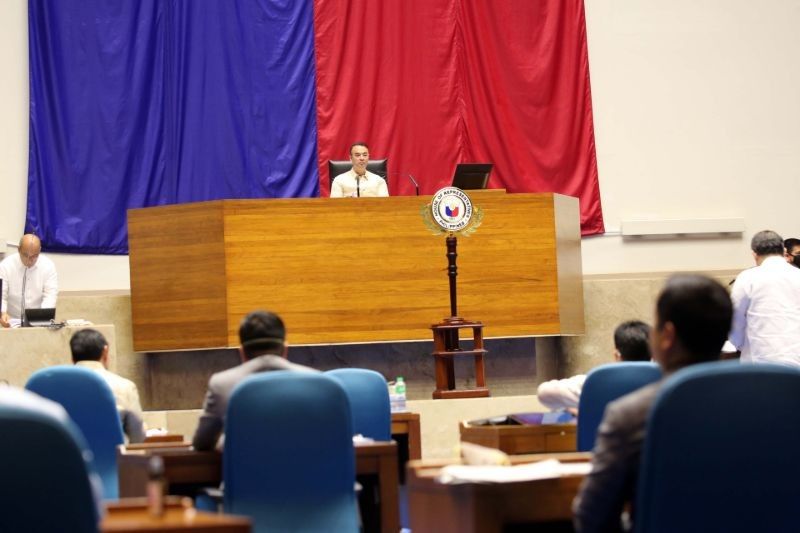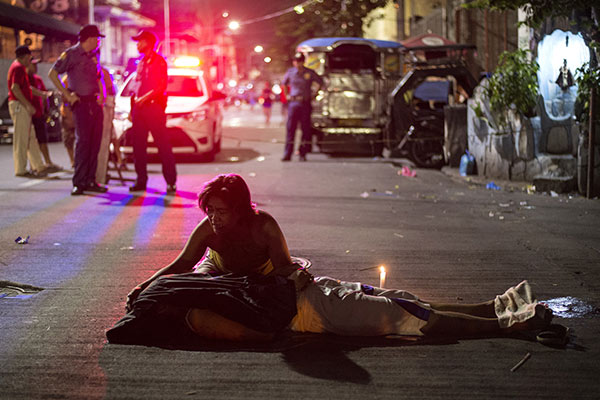Transparency needed in COVID-19 fight, not penalties for 'false info', groups say

MANILA, Philippines — Following the pre-dawn passage of a bill declaring a state of national emergency and granting President Rodrigo Duterte emergency powers, rights groups have raised concerns over a provision that they said could be used against freedom of speech and expression.
Republic Act 11469, or the Bayanihan Heal as One Act of 2020 places in the chief executive's hands the power to "ensure" all local government units are "acting in line with the rules and regulations," adopt measures against hoarding and profiteering, and to quickly procure goods, including medical equipment and supplies, among others.
The handful of lawmakers who voted against the measure said they did so because they believe the president does not need them and that the powers could be abused.
Two rights organizations, though, singled out a provision that they said could specifically be used against the media and against dissent.
Law prone to abuse
In particular, Section 6 (6) of the law penalizes the following with imprisonment of 2 months or a fine ranging from P10,000 to P1,000,000 at the discretion of the court:
"individuals or groups creating, perpetuating, or spreading false information regarding the COVID-19 crisis on social media and other platforms, such information having no valid or beneficial effect on the population, and are clearly geared to promote chaos, panic, anarchy, fear, or confusion; and those participating in cyber incidents that make use or take advantage of the current crisis situation to prey on the public through scams, phishing, fraudulent emails or other similar acts"
International rights organization Human Rights Watch in a statement issued on Wednesday also reminded the administration of its international obligations "to protect the right to freedom of expression, including the right to seek, receive, and impart information of all kinds."
"This provision of the law is over-broad and can easily be misused by Philippine authorities to crack down on online criticism of government efforts," said Phil Robertson, Deputy Asia Director of Human Rights Watch.
"Given the Duterte administration’s well-documented hostility towards freedom of the press and online critics, this law could be used to criminalize any online information the government dislikes."
According to rights group Karapatan, penalties that could possibly be imposed on journalists were not the answer.
"[The government] should hold itself accountable when its own officials make false and wildly outrageous public statements," Karapatan said in a statement.
"It should give the public a detailed, comprehensive, rights-based, mass-oriented, and scientific plan to combat the COVID-19 pandemic as a public health crisis along with its socio-economic impact on the people, especially the marginalized."
It will impact journalists reporting on facts that they gather and on human rights workers who are documenting reports of human rights violations resulting from the imposition of quarantine measures. #NoToEmergencyPowers
— Karapatan (@karapatan) March 25, 2020
The rights group also expressed concern the law gave Duterte "power to arbitrarily define and penalize" fake news, which hey said was concerning.
Cebu governor scolds rapper
Karapatan said similar tactics are already being employed in Cebu, whose governor has reportedly put together a special task force to track down critics of the government's efforts against the novel coronavirus.
The Cebu chapter of the College Editors Guild of the Philippines, an organization of student journalists, documented this in a statement on their official Facebook page, showing Gov. Gwendolyn Garcia scolding the editor of a Cebu City university paper and saying his "clearly uninformed mind that has hastily jumped to an erroneous conclusion."
A local rapper in Cebu was also made to publicly apologize for posting negative comments on government efforts on social media.
READ: Rapper made to swear to never 'swear' again vs government's COVID-19 efforts
Tirades against 'fake news' media
Earlier, the National Union of Journalists of the Philippines (NUJP) said requiring journalists to obtain media passes amid the enhanced community quarantine could be counterproductive at a time when the public needs vetted information from the media.
"We are aware that we need to contribute to the resolution of this emergency and we can do it best by doing our jobs as journalists. Making it difficult for us to contribute does not help at all," the union said.
President Duterte and his aides have not been shy about tagging reputable news outlets as being purveyors of "fake news" in the past.
Both the chief executive and House Speaker Alan Peter Cayetano have publicly admitted having public grievances with the reportage of ABS-CBN Corporation, whose pending franchise bills have yet to be acted on in Congress.
As early as 2016, media watchdogs have been saying that Duterte's tirades against the network were a clear sign of "congressional franchises [being used] as a weapon to control a free press."
Duterte has also singled out networks like Rappler and the Philippine Daily Inquirer for publishing artices critical of him.
"For your information, you can stop your suspicious mind from roaming somewhere else. But since you are a fake news outlet then I am not surprised that your articles are also fake," he was quoted as saying in 2018, referring to an article published by the online news outlet.
During the country's hosting of the 30th Southeast Asian Games, Cayetano, who was among those pushing for the bill's passage in the lower chamber, also called out what he said was a smear campaign among media to discredit the accomplishments of the games' organizing committee which he headed. These claims came despite well-documented lapses on the committee's part.
"Instead of seeking to shut down online information the Duterte administration should respect the rights to freedom of expression and access to information," Human Rights Watch said.
"Rather than abusing people’s free speech rights, the Duterte administration should focus on providing the public with accurate and timely information about COVID-19."
The 1987 Constitution guarantees "the freedom of speech [and] of expression."
For their part, Karapatan said, "If the government wants to counter the so-called proliferation of "fake news" on the COVID-19 pandemic, it should be more transparent before the public and must answer truthfully and prudently to the public's inquiries."
- Latest
- Trending
































